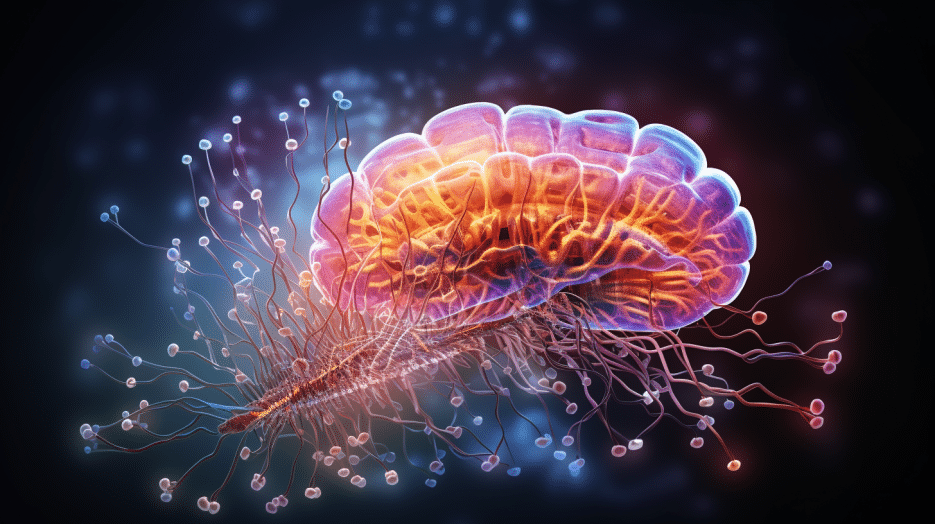New research shows that when mothers experience famine during pregnancy, it can change babies’ brain development in the womb.
This may increase their risk for mental illnesses like schizophrenia and depression later in life.
Key Facts:
- Babies whose mothers experienced famine while pregnant had a higher risk of schizophrenia as adults.
- For depression, results were mixed – some studies showed increased risk, while others showed decreased risk.
- Changes in brain development likely happen through “epigenetic” changes – chemical tags on DNA that control gene activity.
- The insulin growth factor 2 (IGF2) gene often showed altered activity levels in babies exposed to famine prenatally. This gene is important for healthy brain development.
- Only one study so far has explored possible epigenetic changes linking prenatal famine to schizophrenia. This study found changes in the DUSP22 gene.
Source: Clin Epigenetics. 2023 Sep 16
Understanding How Famine Impacts Fetal Brain Development
When mothers don’t get adequate nutrition during pregnancy, it can have lasting effects on their babies’ health.
Researchers have been studying “natural experiments” of famine to understand these effects.
The two famines studied were:
- The Dutch Famine of 1944-1945 during World War 2, lasting 6 months
- The Chinese Famine of 1959-1961 due to drought and mismanagement, lasting 3 years
By following babies born during these famines into adulthood, researchers can see if prenatal famine exposure leads to higher rates of mental illness.
The idea is that malnutrition during critical periods of brain development may change babies’ brain structure and chemistry in ways that make them more vulnerable to problems later on.
Two main findings emerged from this research
- Prenatal famine exposure increased risk of schizophrenia and possibly depression in adulthood.
- Prenatal famine was linked to changes in “epigenetic” chemical tags on DNA that control gene activity in the developing brain.
Increasing Risk of Schizophrenia and Depression
Several high-quality studies consistently found that prenatal famine exposure increased risk of schizophrenia as adults by about 10-20%.

The longer and more severe Chinese famine had a bigger effect than the shorter Dutch famine.
For depression, results were mixed. Some studies showed a higher risk after prenatal famine while others showed a lower risk.
This may be because depression can develop from experiences throughout life, not just in the womb.
In summary, prenatal famine does seem to increase depression risk compared to no famine exposure, but risk is lower compared to those who experienced famine later in childhood.
How Does Famine Change the Fetal Brain?
Researchers think prenatal famine may derail healthy brain development through epigenetic changes.
Epigenetics refers to chemical tags on DNA that control whether genes are turned on or off.
The right epigenetic patterns are vital for developing a healthy brain.
Since the fetus builds its brain from scratch, this is a vulnerable window when trauma like malnutrition can disrupt normal epigenetic programming.
When epigenetic changes affect genes that control brain development, it may increase risk of mental illness decades later.
Several studies found altered activity of the insulin growth factor 2 (IGF2) gene in adults exposed to prenatal famine.
IGF2 helps control growth and development of the central nervous system.
Dysregulation of IGF2 has been linked to schizophrenia, depression, and other mental disorders.
Both increased and decreased IGF2 activity were observed.
This may relate to famine severity – the more severe Chinese famine increased IGF2 activity while the milder Dutch famine decreased it.
Beyond IGF2, a range of other genes involved in brain development showed altered epigenetic patterns after prenatal famine.
This suggests complex changes to key developmental pathways.
Only one study has directly explored epigenetic changes linking prenatal famine to schizophrenia in adulthood.
This study found altered activity of the DUSP22 gene, which is important for brain function.
More research is needed to confirm this mechanism.
The broader picture is that prenatal famine exposure disrupts epigenetic programming of genes vital to healthy brain development.
This includes genes involved in:
- Neuronal development
- Neuroendocrine system (hormones controlling mood, growth, etc)
- Immune system
Altering these foundational genes during fetal development is thought to increase lifelong vulnerability to schizophrenia, depression, and other mental illnesses.
This confirms nutrition during pregnancy is immensely important.
Could Epigenetic Changes Be Reversed?
Unlike DNA sequence, epigenetic patterns are reversible.
So in theory, drugs or lifestyle changes could “reprogram” epigenetic patterns to reduce risk of mental illness after prenatal famine exposure.
Some psychiatric drugs have been shown to reverse epigenetic changes.
Lifestyle factors like diet, exercise and stress reduction can also influence epigenetic activity.
More research is needed to understand whether intervening after prenatal famine exposure could restore normal epigenetic function and reduce mental health risks.
This could have profound impacts for society given how many pregnancies still occur in famine conditions.
Main Takeaways: Prenatal Famine & Mental Health
Mothers’ nutrition during pregnancy shapes babies’ lifelong mental health.
Famine exposure in the womb increases risks of schizophrenia and possibly depression.
Famine likely disrupts normal epigenetic programming of genes vital for healthy brain development.
The IGF2 gene, critical for central nervous system growth, often shows altered activity after prenatal famine.
More research is exploring whether epigenetic changes can be reversed to improve mental health outcomes later in life.
Ensuring adequate nutrition during pregnancy may promote better mental health for generations to come.
References
- Study: Association between prenatal famine, DNA methylation and mental disorders
- Authors: Heike Eichenauer & Ulrike Ehlert







